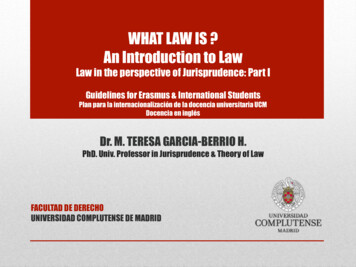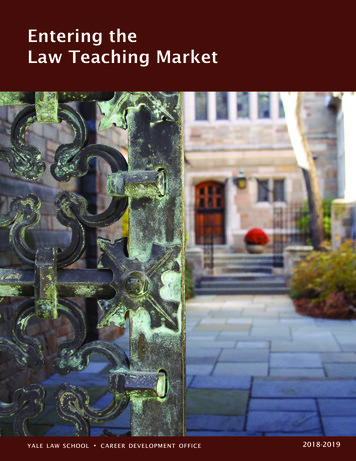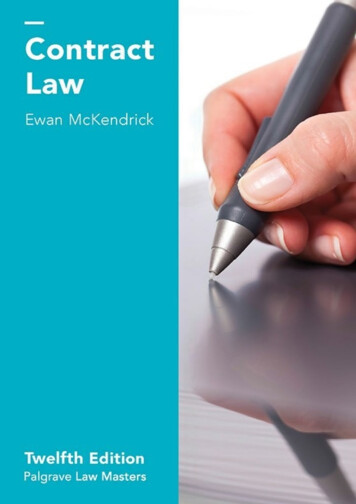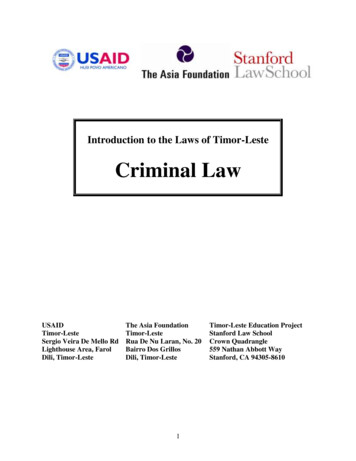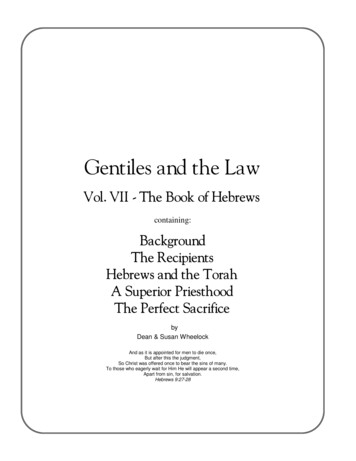
Transcription
Gentiles and the LawVol. VII - The Book of Hebrewscontaining:BackgroundThe RecipientsHebrews and the TorahA Superior PriesthoodThe Perfect SacrificebyDean & Susan WheelockAnd as it is appointed for men to die once,But after this the judgment,So Christ was offered once to bear the sins of many.To those who eagerly wait for Him He will appear a second time,Apart from sin, for salvation.Hebrews 9:27-28
Table of Contents Introduction. . . . . . . . . . . . . . . . . . . . . . . . . . . . . . . 1Background. . . . . . . . . . . . . . . . . . . . . . . . . . . . . . . .2The Recipients. . . . . . . . . . . . . . . . . . . . . . . . . . . . . 5Hebrews and the Torah . . . . . . . . . . . . . . . . . . . . . .13A Superior Priesthood. . . . . . . . . . . . . . . . . . . . . . . .16The Perfect Sacrifice . . . . . . . . . . . . . . . . . . . . . . . . 25Sources. . . . . . . . . . . . . . . . . . . . . . . . . . . . . . . . . . 32Copyright 2008, 2016 by Dean & Susan WheelockAll rights reserved.Printed in the United States of AmericaUnless otherwise indicated the Scripture quotes used in this publication are fromThe New King James Version (NKJV), copyright 1982,published by Thomas Nelson, Inc., Nashville, Tennessee.Used by permission.Other Scriptures used in this booklet are from:Complete Jewish Bible (CJB)[When so indicated] "Scripture quotations are taken from the Complete Jewish Bible.Copyright 1998 by David H. Stern.Published by Jewish New Testament Publications, Inc., www.messianicjewish.net/intp.Distributed by Messianic Jewish Resources Int'l."All rights reserved. Used by permission.
Therefore, the decision was made to put the articles into aseries booklets which could be printed just like the regularissues. Thus, God willing, over time all of the articles will bemade available directly from Hebrew Roots .In the first six volumes of the series we covered all of theGeneral Epistles and the Epistles of Paul, except for the letterwritten to the Hebrews (which is often debated as to whetherPaul actually wrote it or not). There is also some controversyas to who wrote Hebrews if Paul did not. Both of these issuesare addressed in the following pages, after which is anexamination of the text to see if it supports the common theorythat the New Testament abolishes the law (Torah) of the OldTestament.As you read this material, keep in mind that thesediscourses are not intended to be a comprehensive commentaryon everything contained within the letter to the Hebrews. Onlythose portions which pertain to the subject of the Law (WrittenTorah) will be examined in any depth.For an excellent Hebraic roots commentary on the entireNew Testament, we suggest obtaining a copy of David Stern'sJewish New Testament Commentary, published by Jewish NewTestament Publications, Inc. of Clarksville, Maryland. ISBN965-359-008-1 (hardcover).It is our hope that you will find this booklet helpful in bothyour individual studies and in your outreach to others. Introduction I, the LORD [YHVH], have called You in righteousness,And will hold Your hand;I will keep You and give You as a covenant to the people,As a light to the Gentiles,To open blind eyes,To bring out prisoners from the prison,Those who sit in darkness from the prison house.Isaiah 42:6-7When we first began to write the series of articlesentitled Gentiles and the Law (in 2003) the scope of the projectwas not apparent. As the project developed it became clearthat a good way to address the problem was to survey everybook of the Greek Scriptures (New Testament) to see if any ofthem taught that the "Law" had been done away, as so manyhave claimed.Six years and twenty-five articles later the project wasbrought to a conclusion in Hebrew Roots Issue 08-3.However, it soon became obvious that it really was not at anend, for people began to express a desire to see all of thearticles put into a book. The problem with a book is thatHebrew Roots does not have the facilities to publish anythingin perfect bound book format and it is quite expensive to have afull book printed. Such a project would necessitate that wecharge for the book in order to pay the printing and bindingcosts, which is against our stated policy that everything weproduce will be made available free of charge, based upon theavailability of funds, so that all who want copies may obtainthem.Shalom!Dean & Susan WheelockBeit Shalom, 2016 1
written in Hebrew, since it was directed toward JewishBelievers in Y'shua, and Hebrew would have been the logicallanguage for the original letter, unless it was written to Jewswho came from a Hellenistic (Greek culture) background.Then Greek would have been the preferred language.Origen (185 - 254 CE) said the epistle to the Hebrews wasnot written directly by Paul, as the language and style are nothis -- although some phrases do resemble Paul's other writings.Origen believed that Paul was responsible for the ideas andcontent, and that he gave his approval to the letter once it wascompleted. This would account for the Pauline type statements(especially the last chapter) but not for the actual wording,which is said to use a higher form of Greek than his otherletters.Meanwhile Hippolytus (c. 170 - c. 235 CE) and Irenaeus(c. 120/140 - c. 200 CE) both denied that it was written byPaul.Other candidates for the honor of authorship include:Clement of Rome (according to Erasmus who died c. 303 CE),Apollos (according to Martin Luther -- 1483 - 1546 CE), whileJohn Calvin (1509 - 1564) wavered between Luke andClement. Clearly, there is no firm consensus.It must be remembered that Paul never actually wrote hisletters with his own hand, but dictated them to someone whoacted as a scribe. However, he did append a hand writtenclosing statement to many of his letters, such as:"The salutation of Paul with my own hand, which is asign in every epistle; so I write."(II Thess. 3:17) Background And I appeal to you, brethren,Bear with the word of exhortation,For I have written to you in few words.Hebrews 13:22The Gentiles and the Law series continues here witha background examination of the letter written to the Hebrews,the one remaining New Testament epistle which is yet to becovered. The primary purpose of this study is to discoverwhether or not this epistle, in any way, "does away" with thecommandments found in the Written Torah, thereby nullifyingthe "law" of the so-called "Old Testament." Because of thefocus, this booklet is not intended to be a comprehensivecommentary on the entire book of Hebrews.In many ways, Hebrews is the most enigmatic epistle of all,because it is unclear who the original author might have been.There is also disagreement among the scholars as to when itwas written; whether before or after the destruction of theTemple in 70 CE. Another question is, to whom was the letterwritten? It is clear the recipients were Jewish Believers inY'shua -- but where were they located -- in Jerusalem, Rome, orelsewhere?The first chapter, of this booklet, will focus on thesequestions, while the last three chapters will deal directly withthe role of the "law" in Hebrews and whether or not this lettershould be included in the New Testament canon, as somedispute.In between these chapters will be a chapter which will givesome historical background concerning the establishment of theMessianic Jewish community in the city of Pella. We believethis information has a direct bearing upon identifying therecipients of this letter to the Hebrews. Therefore, werecommend that you read all of the chapters in the order theyare presented.While there is a Paul-like closing salutation to the book ofHebrews, it does not include Paul's name. Instead it states:"Know that our brother Timothy has been set free,with whom I shall see you if he comes shortly. 24 Greet allthose who rule over you, and all the saints. Those fromItaly greet you. 25 Grace be with you all. Amen."(Heb. 13:23-25)Two 19th century German Messianic Jewish scholars (Dr.Joiachim Heinrich Biesenthal and Yechiel Lichtenstein) boththought that Paul was the author of this letter. Biesenthal saidthat Paul wrote it "in the dialect of the Mishna, the language ofthe schools." This would mean that it was originally written inHebrew.Lichtenstein was in agreement, saying this letter wasdifferent because Paul was writing to Jews and not to Gentiles.Thus, when he interacted with Jews he wrote as a Jew wouldwrite:"For though I am free from all men, I have mademyself a servant to all, that I might win the more; 20 and tothe Jews I became as a Jew, that I might win Jews; to thosewho are under the law, as under the law, that I might winthose who are under the law; 21 to those who are withoutlaw, as without law (not being without law toward God, butunder law toward Christ [Messiah]), that I might win thosewho are without law; 22 to the weak I became as weak, that Imight win the weak. I have become all things to all men,that I might by all means save some."(I Cor. 9:19-22) Authorship The identity of the author of Hebrews is thought to havebeen lost very early, for even the most ancient manuscripts donot include his name. The Western Church (Roman Catholic)did not accept this epistle into their canon as scripture until the5th century. The Eastern Church (Orthodox) accepted it earlyand claimed Paul was the author. Most of the opinions aboutauthorship, which are available today, came much later -- all ofthem over 100 years after the time of Y'shua.Tertullian (c. 155 - c. 220 CE) gave the title as Barnabasto the Hebrews, believing that it was written by Paul'scompanion Barnabas. The Churches of North Africa acceptedBarnabas as the author.Clement of Alexandria (150 - c. 215 CE), and theAlexandrian Churches, claimed Paul wrote the book ofHebrews originally in the Hebrew language and Luke latertranslated it into Greek. It is most likely that it was originally2
Even though Paul was the "apostle to the Gentiles," (Rom.11:13) his initial commission, given him by Y'shua, alsoincluded the Jewish people as members of the children ofIsrael:"But the Lord said to him, 'Go, for he is a chosen vesselof Mine to bear My name before Gentiles, kings, and thechildren of Israel.'"(Acts 9:15)"God also bearing witness both with signs andwonders, with various miracles, and gifts of the Holy Spirit,according to His own will?"(Heb. 2:4) Internal Evidence Since the writer was a prisoner, or former prisoner (Heb.10:34), who resided in Italy, and who personally knewTimothy, Paul seems to be the likely candidate.One other reference, which seems to point strongly to Paulas the author of this epistle, is in the closing salutation:"Those from Italy greet you."(Heb. 13:24)One thing seems clear, the author of Hebrews had both apersonal and intimate knowledge of those Messianic Believersbeing addressed, and they of him:"But recall the former days in which, after you wereilluminated, you endured a great struggle with sufferings:33partly while you were made a spectacle both byreproaches and tribulations, and partly while you becamecompanions of those who were so treated; 34 for you hadcompassion on me in my chains, and joyfully accepted theplundering of your goods, knowing that you have a betterand an enduring possession for yourselves in heaven."(Heb. 10:32-34) Other Evidence Another piece of evidence, for the authorship of Paul,comes from Simon Peter, the "Apostle to the Circumcision:""But on the contrary, when they saw that the gospelfor the uncircumcised had been committed to me [Paul], asthe gospel for the circumcised was to Peter ."(Gal. 2:7)Peter's second epistle does not designate a specific peoplegroup to whom it was written. However, the fact that Peter wasthe Apostle to the Circumcision (Jewish Believers), coupledwith his opening salutation in the letter known as First Peter(where he identifies himself as writing specifically to those inthe Dispersion), provides us with circumstantial evidence thatthe letter we know as Second Peter may also have been writtento the Diaspora Jewish Believers in Y'shua:"Peter, an apostle of Jesus Christ[Y'shuaHaMashiach], To the pilgrims of the Dispersion in Pontus,Galatia, Cappadocia, Asia, and Bithynia, ."(I Peter 1:1)As we can see, the author of Hebrews either had been, orstill was in prison when this letter was written. The author alsospeaks about the great sufferings of the recipients of this letter.When attempting to identify the recipients of this letter, itmay be significant to recognize that the most severepersecutions against the early Messianic community was amongthe Jewish Believers in Jerusalem and Judea.The author was also well known to the readers, as hehoped to be reunited with them as soon as possible:"But I especially urge you to do this, that I may berestored to you the sooner."(Heb. 13:19)It appears that the epistle of Second Peter was also writtento Diaspora Jewish Believers in Y'shua, for we find that Petermade direct mention that Paul also wrote a letter to the JewishBelievers. We believe the "letter" of which Peter spoke waswhat we know today as the epistle to the Hebrews:"Therefore, beloved, looking forward to these things,be diligent to be found by Him in peace, without spot andblameless; 15 and consider that the longsuffering of ourLord is salvation -- as also our beloved brother Paul,according to the wisdom given to him, has written to you,16as also in all his epistles, speaking in them of these things,in which are some things hard to understand, whichuntaught and unstable people twist to their owndestruction, as they do also the rest of the Scriptures."(II Peter 3:14-16)The author personally knew Timothy, as did the receiversof the letter:"Know that our brother Timothy has been set free,with whom I shall see you if he comes shortly."(Heb. 13:23)It appears that both the writer and the receivers of thisletter were not eyewitnesses of Y'shua when He walked theearth, but were considered to be "second generation" MessianicBelievers. Some say this is evidence that Paul was not theauthor, since he did have a personal encounter with theresurrected Y'shua on the road to Damascus. On the otherhand, Paul did not know Him personally when Y'shua walkedthe earth in the flesh:". how shall we escape if we neglect so great asalvation, which at the first began to be spoken by theLord, and was confirmed to us by those who heard Him, ."(Heb. 2:3)If the "you" of Second Peter designates Jewish Believers,then it is clear that Paul also wrote a letter to Jewish Believersin Y'shua. Of course, it is possible that the letter to which Peterwas referring was a different Pauline epistle which has sincebeen lost, but there is no evidence, of which we are aware, tosupport such a claim. We believe Peter's statement (II Peter3:14-16) refers directly to the epistle to the Hebrews (written tothe Jewish Believers) by the Apostle Paul.What this generation of Believers heard expounded aboutY'shua, was confirmed to them through signs, wonders,miracles, and gifts, demonstrating this was truly a messagefrom God:3
this time you ought to be teachers, you need someone toteach you again the first principles of the oracles of God;and you have come to need milk and not solid food."(Heb. 5:11-12) Other Opinions Despite much of the evidence which points to Paul as theauthor, the Hastings Bible Dictionary comes to the followingconclusion concerning the author of the epistle (book) ofHebrews:"His vocabulary is rich and varied, and in this respectstands closer to the writings of St. Luke than to any otherof the NT books. . For these and similar reasons it isgenerally believed that our author was a scholar ofHellenistic training and most probably an Alexandrian Jewof philosophic temperament and education." (p. 371)While initially, most scholars thought that the book ofHebrews was written to Messianic Jews, more recently somehave concluded it could have been written mainly to Gentiles.The reasoning behind this position is because all of the earlyBelievers had the Hebrew Scriptures taught to them in thesynagogue as a basic teaching of their faith. It is thereforeconcluded that their study of Written Torah would haveincluded details of Temple worship and service and therewould have been no need to write about it:"Of these things we cannot now speak in detail."(Heb. 9:5)However, it seems unlikely that an "Alexandrian Jew ofphilosophic temperament and education" would have beenimprisoned in Italy.One other fact to note is that Hebrews was really notwritten in the style of a letter or epistle, but rather as anexhortation:"And I appeal to you, brethren, bear with the word ofexhortation, for I have written to you in few words."(Heb. 13:22) Timing There are varied opinions as to when the epistle to theHebrews was written. It is generally agreed that if Paul was theauthor it must have been written between 61 - 63 CE, becausethat is when many believe Paul was put to death. However,some place Paul's death as late as 67 CE. If Paul was, in fact,put to death during the reign of the Emperor Nero, he wouldhave died prior to Nero's death, which occurred on June 9, 68CE.Whatever the exact date, if Paul was the writer of the bookof Hebrews it would have definitely been composed prior to thedestruction of the Temple in 70 CE. If Paul was not the author,then it could have been written as late as 100 CE, as someclaim -- although that is highly doubtful in our opinion.Many English translations have a problem with the tensesused in the Greek and sometimes make it sound as though theTemple had already been destroyed. However, Young's LiteralTranslation clarifies that issue when speaking of the Templeservice -- for the author uses the present tense, not the pasttense. For example:"And these things having been thus prepared, into thefirst tabernacle [Holy Place], indeed, at all times the priestsdo go in, performing the services, 7 and into the second[Holy of Holies], once in the year, only the chief priest, notapart from blood, which he doth offer for himself and theerrors of the people, 8 the Holy Spirit this evidencing thatnot yet hath been manifested the way of the holy places[Holy of Holies], the first tabernacle [Holy Place] having yeta standing; 9 which is a simile in regard to the present time,in which both gifts and sacrifices are offered, which are notable, in regard to conscience, to make perfect him who isserving, 10 only in victuals, and drinks, and differentbaptisms, and fleshly ordinances -- till the time ofreformation imposed upon them."(Heb. 9:6-10 YLT)This "book" may be the transcript of a sermon, which thenhad a conclusion added in the form of a closing salutation aswould a letter.Paul, Barnabas, Clement, Apollo, or Luke -- take yourpick. It is our opinion that the epistle to the Hebrews waswritten by Paul in Hebrew or Aramaic and probably translatedinto Greek by Luke or some other Messianic Believer who waswell versed in the Greek language. This would account for theintimate knowledge which the writer (Paul) had of both theidentity of the recipients and the Temple service -- and also forthe fact that the usage of the Greek language was similar inmany ways to the Gospel of Luke and the book of Acts, both ofwhich were written by Luke. The Recipients According to the scholars, not only is the author ofHebrews a mystery, so too are the recipients. Here the list isfairly short. It usually includes the Jewish Believers living inthe Holy Land, the Jewish Believers living in Rome, or theJewish Believers living in Alexandria, Egypt. Of these three,the most ancient tradition favors those living in the Holy Land-- probably in Jerusalem, since the author specifically uses theTemple service to support many of his main points. ThoseJews living in Jerusalem would have been most familiar withTemple service, even if the letter was written after itsdestruction.It seems clear that the author had a single localcongregation in mind, or a group of congregations in a givenregion. In any case the recipients formed a homogenous groupof Jewish Believers in Messiah Y'shua and probably did notinclude non-Messianic Jews. Whoever the recipients mighthave been, their spiritual growth seemed to have stopped justwhen they were expected to blossom forth with vigor:". of whom we have much to say, and hard to explain,since you have become dull of hearing. 12 For though byAs you can see, according to Young's more literaltranslation of this passage, worshippers were (at the time thisletter was written) still offering sacrifices for sin at the Temple.If this was the case, then the letter must have been written priorto the destruction of the Temple in 70 CE. That would easilyplace its dating within the time frame of Paul's ministry, which4
ended sometime during the reign of the Emperor Nero (54-68CE). The Recipients Summary After much consideration it is our opinion that the letter tothe Hebrews was authored by the Apostle Paul and that it wasoriginally written in the Hebrew language. This does not meanthat Paul hand wrote the original manuscript himself for, as wehave seen, it appears that all of his epistles were dictated to ascribe. It was this original document (or a copy) which wouldhave been sent to the Messianic Jews who were the recipientsof the letter.This original Hebrew language version of the letter to theHebrews was, at some point, translated into Greek, and that isthe version from which our English translations have beenderived. This early Greek translation could have been writtenbefore it was sent, but in all probability it was translated later(for some of the so-called discrepancies would, no doubt, havebeen caught by Paul, assuming that he knew Greek, and if ithad been done in his presence). It is possible the Greektranslation was done by Luke. Since Luke was probably notJewish by birth, he therefore may not have had as intimate aknowledge of Temple procedures as would a native born Jewraised in the Jewish faith (such as Paul). This could account forsome of the seeming discrepancies which so trouble somemodern readers.It is also our opinion that the letter to the Hebrews waswritten to the Messianic Jews who were residing in Jerusalemor who, as we will see in the following article, had alreadyremoved themselves to Pella. In either case, it seems evidentthat it had formerly been the custom of the recipients to attendTemple services and now they were denied that opportunity.As to the timing of the writing of the letter to the Hebrews,we would place it after the martyrdom of Ya'acov bqo[y] :(Yah-ah' cove Jacob or James - #3290) in 62 CE, but prior toPaul's death which, we believe, occurred during the reign of theEmperor Nero who himself died in June of 68 CE.Therefore we must give the more earnest heedTo the things we have heard,Lest we drift away.Hebrews 2:1While some of the theories, concerning the recipientsof the letter to the Hebrews touched on in the previous chapter,have a certain amount of merit, we would like to put forthanother view which seems to explain the purpose of the book ina more meaningful way. We will begin by establishing that theJewish Believers in Y'shua continued to worship at the Templefor many years after the death and resurrection of Y'shua in 30or 31 CE. We will then show where those Jewish Believersmay have been residing at the time of the writing of this letter. Temple Worship The recipients of the letter to the Hebrews were apparentlyquite familiar with the services which had been originally heldin the Tabernacle in the Wilderness and were, at that time, wellpracticed in Temple worship. This is not surprising, since itwas the custom of Jewish Believers in Y'shua, who resided inJerusalem, to frequent the Temple:"Now all who believed were together, and had allthings in common, 45 and sold their possessions and goods,and divided them among all, as anyone had need. 46 Socontinuing daily with one accord in the temple, andbreaking bread from house to house, they ate their foodwith gladness and simplicity of heart, 47 praising God andhaving favor with all the people. And the Lord added tothe church daily those who were being saved."(Acts 2:44-47)In addition to this passage, there is also the specificexample of Peter and John going to the Temple at the hour ofprayer (3 p.m., the time when the evening sacrifice began):"Now Peter and John went up together to the temple atthe hour of prayer, the ninth hour."(Acts 3:1)Not only did the Apostles attend Temple Service duringthe time of the sacrifices in order to worship, they used theirpresence there to teach other attending worshippers aboutY'shua HaMashiach. Since everyone present was therespecifically for Temple worship, it stands to reason theApostles would have also participated in the worship serviceitself, teaching the people about Y'shua before and/or afterthose services took place.The general practice of the Temple worshippers was torecite the prayers used by the Priests as the service was beingconducted. At various times, they would prostrate themselvesin homage to the God of Abraham, Isaac, and Jacob. TheApostles would not have had a problem joining in, since theyworshipped this same God whom Y'shua quoted: 5
"15 'If a person commits a trespass [ma'al], and sinsunintentionally in regard to the holy things of the LORD[YHVH], then he shall bring to the LORD [YHVH] as histrespass offering [asham] a ram without blemish from theflocks, with your valuation in shekels of silver according tothe shekel of the sanctuary, as a trespass offering [asham].16And he shall make restitution for the harm that he hasdone in regard to the holy thing, and shall add one-fifth toit and give it to the priest. So the priest shall makeatonement for him with the ram of the trespass offering[asham], and it shall be forgiven him.'"(Lev. 5:14-16)"'But concerning the resurrection of the dead, haveyou not read what was spoken to you by God, saying, 32"Iam the God of Abraham, the God of Isaac, and the God ofJacob?" God is not the God of the dead, but of the living.'33And when the multitudes heard this, they were astonishedat His teaching."(Matt. 22:31-33)oOn occasion they may even have brought an Olah hl'[o(Oh-lah' a Burnt Offering - #5939) to express their heart feltappreciation to God for what He had done by sending His ownSon, Y'shua, as the Anointed One -- the Mashiach x;yvim'(Mah-shee'-ahk Messiah - #4899). On other occasions, theymay have brought a Shelem l,v, (Sheh-lehm' a PeaceOffering - #8002), the meat of which would have been eatenwith other Messianic Believers as a Festive meal consecrated toGod.Based upon the teachings found in the book of Hebrews,Messianic Believers would not have been required to bring asacrifice for sin, a Chattah ha'Jx' ; (Hah-tah' Sin Offering #2403) because that offering had been covered by the bloodsacrifice of Y'shua:"He then would have had to suffer often since thefoundation of the world; but now, once at the end of theages, He has appeared to put away sin by the sacrifice ofHimself."(Heb. 9:26)To be found guilty of not bringing this offering, when itwas required by Written Torah, would result in excluding thatperson from future Temple Worship. Paul's Example The fact that Messianic Believers still participated incertain Temple Services is also made clear when, late in Paul'sministry, he participated in the Temple Service which wasrequired for the removal of a vow under which he had placedhimself:"So Paul still remained a good while. Then he tookleave of the brethren and sailed for Syria, and Priscilla andAquila were with him. He had his hair cut off at Cenchrea,for he had taken a vow."(Acts 18:18)"And you know that He was manifested to take away(I John 3:5)our sins, and in Him there is no sin."It is unclear exactly what kind of a vow Paul undertook,but it seems to be somehow related to the Nazirite vow (Num.6). However, in the strict Nazirite vow Scripture does not saythat the person taking the vow was required to shave his headbefore beginning, but rather when the vow was completed, or ifthe time period of the vow was interrupted by contact with adead body. Even then, the shaving was supposed to be done inconjunction with a specific Temple sacrifice:"'And if anyone dies very suddenly beside him, and hedefiles his consecrated head, then he shall shave his head onthe day of his cleansing; on the seventh day he shall shaveit. . 13 Now this is the law of the Nazirite: When the daysof his separation are fulfilled, he shall be brought to thedoor of the tabernacle of meeting. . 18 Then the Naziriteshall shave his consecrated head at the door of thetabernacle of meeting, and shall take the hair from hisconsecrated head and put it on the fire which is under thesacrifice of the peace offering.'"(Num. 6:9, 13, 18)"The next day John saw Jesus [Y'shua] coming towardhim, and said, 'Behold! The Lamb of God who takes awaythe sin of the world!'"(John 1:29)Based upon statements found in the letter to the Hebrewsand in the book of Acts (the Acts of the Apostles), it is entirelypossible that some of the Messianic Jewish Believers inJerusalem might have brought the Chattah Offering, asrequired by the Written Torah, after having committed aninadvertent sin. However, the Rabbis always taught thatintentional sin could only be forgiven through repentance.While it is unclear what the practice of these JerusalemMessianic Jews might have been in relation to the ChattahOffering, one thing is clear -- Messianic Believers in theDiaspora (whether Jew or Gentile) could not bring a ChattahOffering (or any other for that matter) unless they made apilgrimage to Jerusalem.It is also possible (even probable) that frequent Templeworshippers, among the Messianic Jewish Believers residing inand around Jerusalem, might have found it necessary, onoccasion, to bring an Asham v'a' (Ah-shahm' TrespassOffering - #817). That would have been required if theindividual inadvertently entered the Temple complex in a stateof ritual
As you read this material, keep in mind that these discourses are not intended to be a comprehensive commentary on everything contained within the letter to the Hebrews. Only . illuminated, you endured a great struggle with sufferings : 33 partly while you were made a spectacle both by reproaches and tribulations, and partly while you became .







